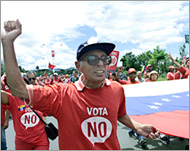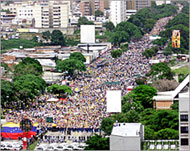Venezuela votes on Chavez leadership
Venezuelans voters have turned out in massive numbers to decide whether to revoke the mandate of controversial President Hugo Chavez.

Entire families showed up on Sunday with picnic baskets and camping chairs in readiness for a long wait, with lines outside polling stations stretching for over a kilometre.
“These are the Olympics of democracy,” Chavez said after casting his ballot in 23 de Enero, an impoverished neighbourhood where he draws massive support.
“This is the largest turnout I have ever seen,” said former US President Jimmy Carter, who has monitored more than 50 elections worldwide and led an observer team in Venezuela.
Many people showed up around midnight, six hours before the voting even began.
Both Chavez, who has ruled since 1998, and his opponents have predicted they will win the referendum.
The vote and its aftermath will be watched across the world because of Venezuela’s importance as a major oil producer and leading energy supplier to the US.
At stake in Sunday’s vote is the survival of Chavez’s self-styled revolution, a populist government that has spent millions of dollars of Venezuela’s oil wealth on subsidised health, education and other social programmes for the poor.
Confident
Chavez told Aljazeera on Sunday he was sure he would win the referendum and stay in office.
But in the event of losing the vote, he said he would nominate himself for the presidential elections next month even if the opposition said it was not his right.
Losing the referendum would be a temporary loss as the opposition lacked a real leader, he added.
 |
|
The president’s core constituency |
For Chavez’s opponents, the referendum is the last opportunity before December 2006 elections to vote out a leader they see as a bullying dictator, squandering Venezuela’s oil resources to promote a dangerous, self-serving revolutionary project.
The recall referendum, provided for in a 1999 constitution promoted by Chavez himself, will be a first in Venezuela’s political history.
To recall him, the opposition must equal or beat the 3.76 million votes he received when he was re-elected in 2000.
But if the “No” vote is bigger, he stays in office.
Fears of violence
If Chavez loses, a presidential election will be held within 30 days. The Supreme Court must rule on whether he can stand in that poll.
Chavez has said he will accept whatever result is announced by electoral authorities.
But the former paratrooper, who led a failed coup six years before winning the 1998 elections, has fanned fears of a violent backlash if he loses by saying his supporters in the military and the oil industry will not accept a government formed by his enemies.
 |
|
The opposition is mainly drawn |
Some pro-Chavez groups say they are ready to defend his “revolution” with arms if necessary.
On the other hand, analysts say certain opposition groups may link up with disgruntled elements in the military to start a guerrilla war if Chavez wins.
Combined with events in Iraq, worries about the Venezuelan referendum triggering violence and possibly disrupting the country’s oil supplies have pushed world oil prices to record highs – more than $46 a barrel on Friday.
Electoral officials and international observers have appealed for calm.
Opposition’s uphill battle
“I have full confidence that the referendum will be honest, fair and transparent,” former US President and 2002 Nobel Peace Prize winner, Jimmy Carter, said on Saturday.
Carter and outgoing Organisation of American States secretary general Cesar Gaviria are leading a team of international observers to the Venezuelan referendum.
|
“Although the opposition has criticised Chavez’s confrontational leadership, its own failure to provide a legitimate alternative strategy will likely lead to its defeat on 15 August” Mark Scott, |
The Washington-based Council on Hemispheric Affairs (COHA) says both Chavez and the Venezuelan opposition have confused the well-being of the country’s people with their own self interests and political futures.
COHA’s Mark Scott said: “The opposition has been unable to convince the poor that it has left its tarnished past behind as the 15 August referendum approaches.
“Unlike Chavez’ highly acclaimed welfare ‘missions’, his opponents have never articulated a clear plan to address the social needs of the lower class.”
He added: “Although the opposition has criticised Chavez’s confrontational leadership, its own failure to provide a legitimate alternative strategy will likely lead to its defeat on 15 August.”